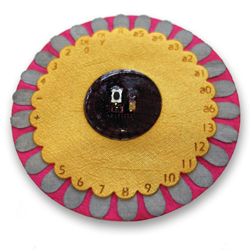Continued from Part 1.
| ML | Nathan: Spark Fun says, “Our strongest products are our simplest ones.” Explanation? |
| ML | Have you other guys also found this to be true? |
| DR | being iconic is more viral? |
| DR | simple = iconic |
| BC | certainly. lower learning curves. |
| NS | If
you design a widget for model helicopters, you quickly limit your
market. If you design a simple breakout board for the pressure sensor
that could go into a model helicopter, anyone can use it. |
| BC | a lower learning curve also indicates that the design works intuitively. |
| NS | I
quickly learned I have very little grasp of what’s creatively possible.
What I mean – I think I know all the possible applications for a
product, then a customer comes along and says ‘Hey, checkout what I
did’. Blows me away every time. |
| ML | well put. |
| DR | Nathan, this happened with Ambient and energy companies. |
| DR | They found the Orb, and are now using thousands to show people load on the grid |
| DR | I knew nothing about “demand response” |
| DR |
“I think I know all the possible applications for a
product, then a customer comes along and says ‘Hey, checkout what I
did’. Blows me away every time.”
| BC | any predictions for the next couple years of DIY? |
| NS | Make Magazine is scary. |
| BC | scary? |
| NS | Make is growing rapidly and enabling a sleeping community |
| NS | Sorry – Scary in a good way |
| BC | don’t
you feel a threshold approaching? they’re going to have to start
reprinting some of their articles, unless they start to get really
obscure |
| NS | Brian -> Not sure. I think as with anyone seeking knowledge, once you make the LED blink, the limits start disapearing. |
| BC | david, can use a radio transmitterrself to update the orbs? are the specs published? |
| DR | there is an open API to the orb. and you can hardwire to a PC |
| DR | |
| DR | and we post schematics to buildr own |
| NS | Hah! It’s a PIC 16F876. I loved that chip. |
| BC | david – nice. |
| ML | Why has Monome documented its production process and linked their production companies? (http://monome.org/40h/process/2/) |
| BC | we’ve taken the route of having no secrets. |
| BC | hence the open source everything. |
| ML | DR: how bout you guys, why post the schematics? |
| DR | To encourage developers to experiment and play |
| NS | I don’t like the phrase ‘open source’. As is Brian, we’re just open about what we do. |
| BC | we think it’s also valuable for people not to just “take our word for it” that our devices are 100% domestically produced. |
| DR | The product is only $99, so they are likely to buy more if they do |
| DR | or tell their friends |
| DR | or write a new data channel for our network |
| DR | that others can use |
| BC | open source is a bad word, in that most don’t understand it, assuming it means free, as in beer |
| BC | posting schematics and firmware is a sort of “infinite warranty” |
| BC | if know how something works, can fix it, or find someone pretty easily who can fix it. |
| BC | it also allows for derivative and exciting projects, which only help bring more people to the community |
“Posting schematics and firmware is a sort of ‘infinite warranty.’ If know how something works, can fix it, or find someone pretty easily who can fix it.”
| ML | “infinite warranty” = interesting concept. |
| BC | |
| BC | |
| BC | nathan, i’d like to hear your opposition to open source (or the phrase itself) |
| NS | Brian
-> People are mis-using it? Over using it? SparkFun doesn’t really
have anything open source – we just like to share info. Is that really
technically open source? We don’t bother with publishing a license with
each post. |
| DR | What’s the Ambient device that you’d like to see? |
| DR | We are working on some “presence push puppets” |
| DR | if your friends are online that character stands up |
| NS | Arduino led to Leah Buechley developing her wearables lines : http://www.cs.colorado.edu/~buechley/. Open leads to greater things. |
| NS |  |
| BC | david, what’s your take on input devices? |
| DR | I’m very interested in passive input |
| DR | like pedometers, motion and prox sensors |
| BC | unconscious input? |
| ML | last.fm is a good online example of passive input |
| ML | (collects data from what play in iTunes) |
| ML | DR: i love the idea of the ambient umbrella. |
| ML | |
| ML | but i lose umbrellas so much i could never justify spending $125 on one of ‘em. |
| DR | |
| BC | so, explain the umbrella a bit more. does it show a prediction? |
| DR | just put this umbrella near the door to know if it’s going to rain |
| DR | remember to take a cheap one if it’s blinking |
| BC | too bad philly has a 100% failure rate on predicting the weather, ha |
| DR | data is from accuweather.com |
| DR | from state college PA |
| DR | There are different pulse patterns for different types of precip: rain, snow, thunder, drizzle |
| ML | how are sales on it? |
| DR | Hammacher is selling some |
| DR | it only shipped this month |
| DR | expect sales to be low |
| DR | but it’s a nice demonstration “flagship product” |
| ML | yeah, it’s value is instantly understandable. |
| BC | do guys feel the desire to ever be more disconnected from your data? |
| ML | yes, i see people with bluetooth headsets on 24/7 and i feel kinda bad for them. “always on” isn’t necessarily desirable. |
| BC | yes… a sort of “what’s the point?” |
| NS | There’s
plenty of things I’d like to have access to without having the boot the
computer. I foresee more ambient devices helping me disconnect from the
keyboard. |
| ML | What
is the biggest challenge a small team faces when they try to build
physical products? it seems so different from the software world. |
| BC | tooling costs and revisions. |
| BC | tooling
is producing the equipment (usually a mold or something) that fits into
a large machine, which produces smaller parts. in our case it’s the
silicone keypads. |
| NS | I second that. |
| DR | Our biggest advantage is glance-ability and ease of use. We offer the same user experience as a clock. Pop in batteries and go! |
| NS | Economies of scale hurts the small guys. |
| BC | programming/etc
information can be completely mined. the amount of good
mechanical/materials data out there is much harder to locate, and often
requires extensive experience with each process or material. |
| NS | SparkFun has been successful because we’ve found obscure ways to manufacture short run. |
| NS | |
| NS | Here is a tutorial that breaks down the different approaches to SMD reflow soldering, what we’ve learned, and what to steer clear of. |
| NS | Yeah. Big electronics companies have big expensive machines. We don’t have that luxury. |
| BC | it’s also costly to outsource circuit assembly for the most part. |
| BC | i’d
say the best thing small businesses can do is establish good
relationships with their suppliers. think long-term, not just one-off
jobs for cheap. |
“The best thing small businesses can do is establish good
relationships with their suppliers. think long-term, not just one-off
jobs for cheap.”
| JF | I just love how the Monome is dead simple. On/off, binary. No sound, no brightness, etc. |
| JF | I’m sure a lot of that was out of necessity for v1 |
| JF | But I’m curious about your strategy for sticking to that simplicity. |
| JF | Have you found it difficult? Any tips for people who keep having those “man, wouldn’t it be cool if…” moments? |
| JF | And wind up going off track. |
| BC | when moving towards larger grids (16×16
for example) there’d simply be an overabundance of information. |
| BC | the
same with people asking for pressure-sensing, and multi-colors. it
doesn’t fit our vision. that doesn’t make them bad ideas, it just makes
different devices. |
| BC | like
the ambient devices, binary facilitates at-a-glance. if we have 16
shades, it’d be a bit meaningless. so could show a lo-res movie,
but that’s really a complete gimmick, not really usable. |
“It
doesn’t fit our vision. that doesn’t make them bad ideas, it just makes
different devices.”
| JF | I like the “it doesn’t fit our vision” |
| JF | Seems like an easier sell when you’re making hardware. |
| BC | part of the reason we post all sources is also so people could theoretically expand the design… |
| BC | i like to tell people “learn how, and go for it” |
| BC | “doesn’t fit our vision” i think i read something like that in your guys’ book. |
| JF | Software
seems so much easier for people to say “come on, 37s, just make this
change… wouldn’t it be easy to…” etc. With hardware I’d imagine
there’s less pressure. Is that a fair statement? |
| NS | No. We just get a different sort of people :) |
| BC | i
think it actually might be a bit easier. people tend to respect the
decisions we’ve made. and when we “help” them make the changes
themselves, who’s going to complain? |
| BC | we don’t have to change it for everyone, i guess, if help some people do it themselves. |
| BC | (that’s not an option with the web, i know) |
| NS | But
the cool thing is that people are doing it. Do we ask the local
hardware store to stock something and they listen? Not really. But
online, the community is ready and willing to make suggestions and ask
for new things. |

Luke
on 30 Jul 07Nathan’s wrong, though, there at the end. Changing things for yourself is an option with much of the web these days, via APIs. That’s what they’re really all about, the ability for interested parties (like the people who are using the specs posted by SparkFun) to build and further an application that they didn’t write.
Nivi
on 31 Jul 07Great article.
A small suggestion: These Fireside chats were better when you summarized the highlights of the conversation at the beginning of the article.
This discussion is closed.